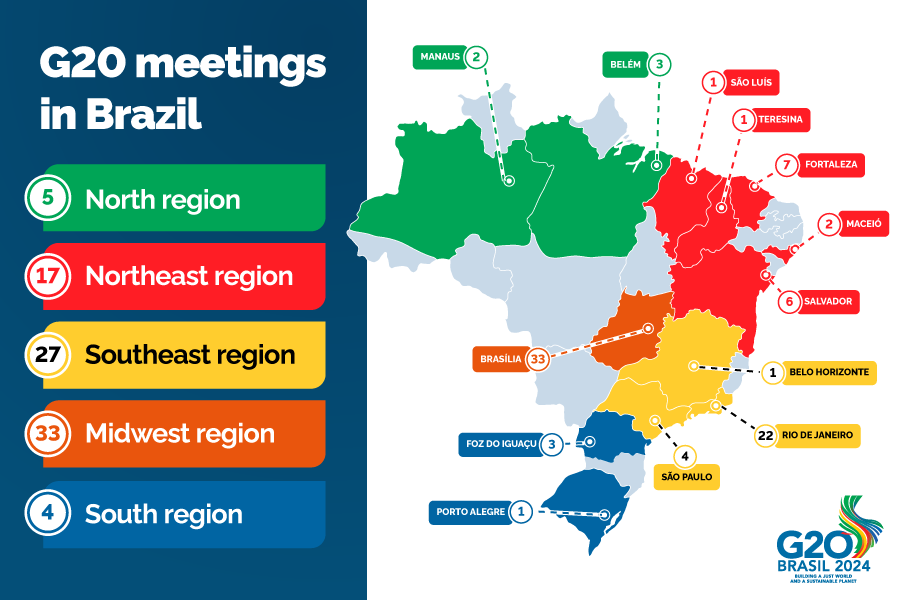Mauro Vieira, Brazil’s Foreign Affairs Minister, at the end of the first meeting of the G20 Brasil, outlined the intentions of the Brazilian presidency of the Group, in a search for consensus on social, environmental and economic issues.
With authorities from the world's largest economies, 19 countries plus the African Union and the European Union, in addition to eight invited countries, the first meeting of the G20 Brasil Sherpa Track concluded this Tuesday (12). Focused on the discussion of the Group's working methods and the priorities proposed by the country in its mandate, the two-day meeting was attended by the Minister of Foreign Affairs, Mauro Vieira, who made a statement to the Sherpas of the member countries.
In November 2024, before the final summit between Heads of Government and State, the first G20 Social Summit will take place.
In addition, Mauro Vieira highlighted Brazil's proposal to intertwine the work of the tracks, Finance and Sherpas, understanding that political discussions and macroeconomic coordination are not separate issues. Another unprecedented objective assumed by the Brazilian presidency.
"We will work to build consensus within the Group, listening to all members and seeking the highest level of ambition for the G20 to produce results," said the Minister.
Sherpas and Finance Tracks Joint Meeting
On Wednesday (13), President Luiz Inácio Lula da Silva is scheduled to attend the joint meeting of G20 sherpas, deputy finance ministers and central bank vice-presidents. The following days (14 and 15) will see the Finance Track meeting, to align the work.
After this first cycle, the next G20 meetings are scheduled for next year, in the second week of January, by videoconference.
Check out the full text of Minister Mauro Vieira's speech
Brasília, 12 de dezembro de 2023
Closing speech by Brazil’s Minister of Foreign Affairs, H.E. Ambassador Mauro Luiz Iecker Vieira
Distinguished Sherpas,
Heads of Delegation,
Ladies and gentlemen,
It is an honor for Brazil to hold the rotating presidency of the G20. It is also an honour for the Brazilian Ministry of Foreign Affairs to host its first Sherpas Meeting here at the Itamaraty Palace, one of the most iconic Brazilian landmark buildings, designed by architect Oscar Niemeyer.
Brazil’s G20 Presidency is part of a sequence of four developing countries chairing the group. I highlight this point to underscore that developing countries have been taking up growing responsibilities in the search for solutions for the many challenges of our times.
We must tackle problems that range from geopolitical conflicts to hunger and malnutrition, from climate change to the risks of new pandemics, from high inflation to the rise of poverty levels. As in the past, the world looks up to the G20 for lasting solutions to shared global challenges.
The G20 brings together a substantial share of the world´s GDP and population. More importantly, it brings together a broad range of developed and developing economies from all regions of the world, blurring the north and south, the east and west divides.
The inclusion of the African Union, in that sense, greatly adds to the bloc. On behalf of Brazil but certainly reflecting the common sense in the room, I would like once again to welcome the African Union as a full-fledged member of the G20.
Ladies and gentlemen,
As extensively discussed in today´s session, Brazil’s G20 chairship will focus on three general priorities:
1) to foster social inclusion and fight poverty and hunger;
2) to promote energy transitions and sustainable development in its three pillars – the economic, social and environmental; and
3) to advance the reform of global governance institutions.
These three priorities echo Brazil´s ambition to “build a just world and a sustainable planet”, the motto of our G20 Presidency.
In terms of working methods, Brazil intends to bring the two tracks of the group – the Sherpa and the Finance tracks – closer together. This reflects our view that discussions on policy and on macroeconomics coordination should go hand-in-hand.
Brazil also wants to foster the dialogue with civil society and its participation in the activities of the group. A G20 Social Forum – to take place in Rio de Janeiro in the days preceding the Leaders’ Summit – will bring together representatives of the existing engagement groups and other segments of civil society that may offer meaningful contributions to the G20.
Ladies and gentlemen,
The global community is facing several overlapping crises. Ongoing conflicts in different parts of the world demand our diplomatic efforts in a scale unseen in the recent past. The climate crisis is an ever-growing concern for us all, with record high temperatures being registered this year in many countries, including Brazil. At the same time, inequality and poverty persist, making it increasingly difficult for us to fulfill our promise of “leaving no one behind”. Sadly, human beings are being left behind – and the climate emergency will only exacerbate this problem, as the poorest will suffer the most. This is not acceptable by any standards.
Brazil is a large developing country with no geopolitical quarrels; a cultural mix bridging America, Africa, Europe, the Middle East and the Far East, all living in peace and cohesion; a large agricultural exporter, and yet one of the countries with the largest share of native forests still standing. We also have unique credentials regarding peace and security. Our region – Latin America – opted for peace, for denuclearization, for cooperation instead of zero sum games. We have a century old tradition of solving our issues through diplomacy and negotiation.
Holding the G20 presidency, we do not plan to solve the problems of the world. Our plan is to present you with a set of good starting points, and we are ready to give our share of contributions.
During our chairship, we will work to build consensus within the group, listening to all members and seeking a high level of ambition for a result-oriented G20.
Count on Brazil as chair country for the year ahead.
Thank you.
